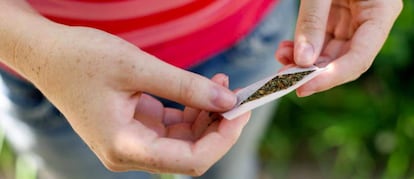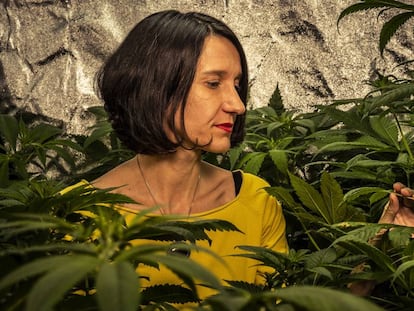The bottom line on Madrid¡¯s hashish: 75% of samples contain fecal contamination
A scientific study by pharmacist Manuel P¨¦rez Moreno of 90 types of cannabis resin bought in the region has revealed high levels of E.coli bacteria, posing a threat to consumers¡¯ health

Manuel P¨¦rez Moreno has spent more than a year looking for drug dealers on the streets who sell cannabis. But the 54-year-old Madrile?o father of two claims that he has never smoked a joint in his life. His mission has involved visiting neighborhoods in the Spanish capital as well as neighboring cities in the region such as Parla, Alcorc¨®n and Alcobendas. When he arrived in these new locations, he would head to a bar and ask questions like: ¡°Do you know where I can buy hash?¡± Once he¡¯d found the local dealers, he would check out the merchandise, pay for it and take it away with him.
P¨¦rez Moreno is a pharmacist from the veterinary faculty of Madrid¡¯s Complutense University. He managed to collect 90 different samples of cannabis resin, all from different sources. The results of his studies into the narcotics constitute the first detailed study of the chocolate ¨C as the drug is known in local slang ¨C available on Spanish streets.
Seventy-five percent of the samples analyzed contained large quantities of the E.coli bacteria, which is an indication of fecal contamination
¡°The majority of the hash sold in the Madrid region is not apt for human consumption, mainly due to microbiological criteria, and it represents a danger for health,¡± concludes the study, which was published in the magazine Forensic Science International.
More than 31% of the Spanish population aged between 15 and 64 has consumed cannabis at some point in their lives, according to the latest report on drugs from the Spanish Health Ministry. Nearly three million people have smoked it in the last year. P¨¦rez has some bad news for these people. Seventy-five percent of the samples he analyzed contained large quantities of the E.coli bacteria, which is an indication of fecal contamination.
P¨¦rez puts this down to the modus operandi of many traffickers. In Morocco, they wrap up small pellets of hash ¨C referred to as bellotas, or acorns ¨C in plastic film, and they swallow them one by one after having eaten yogurt to neutralize their stomach acids. ¡°When they get to Spain, they take a laxative and expel the bellotas,¡± he explains. ¡°And then they¡¯re put on sale.¡±
Forty percent of the bellotas he examined carried the smell of feces.
P¨¦rez¡¯s study points out that in recent years the number of cancer patients who smoke cannabis, in a bid to reduce the secondary effects of their chemotherapy, has been on the rise. ¡°These patients have a weakened immune system, meaning that an infection caused by the consumption of contaminated or adulterated hashish could be fatal,¡± the authors of the study warn.
In 10% of the samples, P¨¦rez¡¯s team also detected Aspergillus fungus, which can cause infections and dangerous allergic reactions
The average amount of bacteria in each gram of resin was 500 times higher than the maximum amount established by the United States for marijuana or for the European regulations covering produce such as fruit or tea.
But fecal bacteria was not the only risk. In 10% of the samples. P¨¦rez¡¯s team also detected Aspergillus fungus, which can cause infections and dangerous allergic reactions. ¡°Aspergillosis can cause death if it goes untreated,¡± the pharmacist warns.
¡°This is clearly a public-health problem,¡± explains biologist Inmaculada Santos, the co-author of the study and also a professor at the veterinary faculty. ¡°The quantities of bacteria that we found are appalling. The problem is not just inhalation. Hashish is constantly manipulated [by users] with their hands.¡± The authors of the study also warn that consumers play down the contamination because they think that it will be eliminated by combustion. ¡°There are no filters on joints,¡± explains P¨¦rez. ¡°You are not just breathing in smoke, but also particles.¡±
¡°It¡¯s a really interesting study,¡± says psychologist Claudio Vidal, from Energy Control, a project that seeks to reduce the risks of drug consumption. But he is cautious. ¡°It¡¯s a low number of samples, and we don¡¯t know how many batches of hashish were circulating at that time. We can¡¯t know if the results are representative of the hashish that is sold in the Madrid region or in Spain.¡±
The average amount of bacteria in each gram of resin was 500 times higher than the for the European regulations covering produce such as fruit or tea
In 2012, Energy Control analyzed 170 samples of hashish, and fungus, cutting agents or vegetable traces were found in in 4% of them. However, the researchers were not looking for bacterial contamination.
Spanish authorities decommissioned 335 tons of cannabis resin in 2017, but P¨¦rez stresses that the quality of the drugs found in large busts is very different from the bellotas sold on the street. Hashish that is sold in brick form usually arrives on board speedboats. P¨¦rez¡¯s team has also analyzed 17 of these packages. Thirty percent were found to have amounts of fecal bacteria that exceeded safe limits.
¡°This type of contamination is down to the fact that hashish is illegal in Spain,¡± explains Vidal. ¡°In a regulated market, that would be unthinkable. Pharmacist Manuel P¨¦rez sums up his project with the title of a 2013 book published by the psychologist Eduardo Hidalgo: Do you know what you¡¯re taking?
P¨¦rez explains that to carry out his study, he paid for the drugs out of his own pocket and then destroyed the samples with hydrochloric acid after analysis. ¡°I couldn¡¯t imagine asking for a grant to buy hashish,¡± he jokes.
English version by Simon Hunter.
Tu suscripci¨®n se est¨¢ usando en otro dispositivo
?Quieres a?adir otro usuario a tu suscripci¨®n?
Si contin¨²as leyendo en este dispositivo, no se podr¨¢ leer en el otro.
FlechaTu suscripci¨®n se est¨¢ usando en otro dispositivo y solo puedes acceder a EL PA?S desde un dispositivo a la vez.
Si quieres compartir tu cuenta, cambia tu suscripci¨®n a la modalidad Premium, as¨ª podr¨¢s a?adir otro usuario. Cada uno acceder¨¢ con su propia cuenta de email, lo que os permitir¨¢ personalizar vuestra experiencia en EL PA?S.
?Tienes una suscripci¨®n de empresa? Accede aqu¨ª para contratar m¨¢s cuentas.
En el caso de no saber qui¨¦n est¨¢ usando tu cuenta, te recomendamos cambiar tu contrase?a aqu¨ª.
Si decides continuar compartiendo tu cuenta, este mensaje se mostrar¨¢ en tu dispositivo y en el de la otra persona que est¨¢ usando tu cuenta de forma indefinida, afectando a tu experiencia de lectura. Puedes consultar aqu¨ª los t¨¦rminos y condiciones de la suscripci¨®n digital.











































